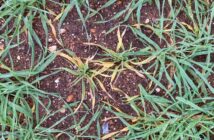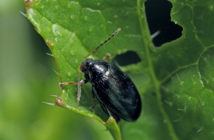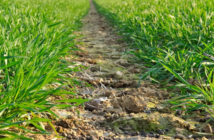With the warm, wet and windy autumn so far, growers have been struggling to find an autumn spray window for post-emergence herbicides in rape. But now the focus has to shift to water stewardship. Although there is still time to apply the residual herbicides ASTROKerb or Kerb Flo 500 in oilseed rape as the spray window doesn’t close until the end of January, growers need to refocus and be responsible in order to avoid any possibility of water contamination. The Voluntary Initiative outlines a number of things to think about. Firstly see if field drains are flowing, (Avoid ????) Avoid fields where the slope is less than 5%, avoid fields that are NOT bordered by a watercourse, Avoid fields with no field drains, go for crops that are well established. There may be some opportunities to interrupt the lifecycle of black-grass with a chemical that works in a different way to those in cereals. Both products work well in December and right the way through to their cut-off date, the 31st of January But help reduce the risk of contaminating water.
“Kerb Flo 500 or AstroKerb both contain the residual active ingredient propyzamide that works in a completely different way on black-grass to the herbicides commonly used in cereals. So if these herbicides are used to their best effect in rape and as part of an integrated programme, there is a real opportunity to reduce the black-grass burden in following cereals across the farm. If application conditions are right, farmers can expect levels of black-grass control from AstroKerb or Kerb Flo 500 frequently in excess of 90%,. We have seen successful results from AstroKerb and Kerb Flo 500 applied in throughout December and January,” says David Roberts of Dow AgroSciences.
“But conditions need to be right and applications should only be made with regard to water stewardship. In other words do not spray when there is any risk of contamination to adjacent watercourses. In many areas the soil temperatures have only just got down to the right level of 10°C but many soils are saturated so you need to be careful to avoid any run off,” warns David.
“Propyzamide in Kerb Flo 500 is soil-acting, so spraying wet weeds at run off or after light rainfall is not an issue. In colder conditions its activity is prolonged and because frosts cause black-grass to throw out more adventitious roots, there is improved uptake of propyzamide. Kerb Flo 500 can be applied in frosty weather. However do not spray onto frozen ground if rain is forecast as this could result in run-off into water courses. Precautions are vital in order to avoid contaminating water. AstroKerb, on the other hand, contains the residual propyzamide plus the contact-acting aminopyralid and so the broad-leaved weeds targeted, poppies and mayweeds, are best controlled when applications are made to a dry leaf. With the potentially difficult conditions ahead, there should be no reduction in dose rates,” he warns.
David has seen that if you spray Astrokerb or Kerb in cold conditions, you need to be patient as weeds take a while to die. “Weeds only start to show symptoms and die when active growth recommences. You can also look out for the classic symptoms of propyzamide-affected black-grass, such as swollen stem bases and purple or reddening discolouration. Propyzamide is known to work slowly and it can take up to three months to kill weeds. The herbicide’s activity will not be affected by cold temperatures after application, however.”
He says that this year many oilseed rape crops have large canopies. “Trials with Kerb Flo 500 demonstrate that a full oilseed rape crop canopy at the time of application makes no difference to the final levels of black-grass control. Astrokerb has contact and root activity on its main broad-leaved weeds, poppies and mayweeds. In our trials, when crop canopies were large, control of these weeds was good. However if, despite our positive experiences you are still concerned, wait until the frost has opened up the crop canopy before you apply these residual herbicides, but do so before the cut-off date.”
David reminds growers that, in order to maximise the efficacy of the residual active propyzamide, soil temperatures need to be below 10°C and falling and the soil should be adequately moist. “The ultimate decision to spray must always be based on local conditions, including the ability to travel and the potential risk to watercourses. Maintaining careful Stewardship of residual herbicides in oilseed rape is vital to ensure the long term availability of these important herbicides,” he says.



